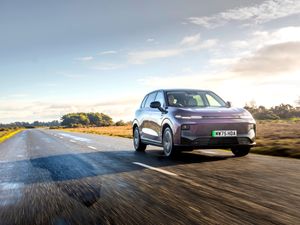First Drive: The Toyota Aygo X brings crossover style to the city car segment
Toyota has reinvented the Aygo, giving it more space and diet-SUV looks. Darren Cassey puts it to the test.
What is it?

The city car is evolving. No longer do buyers simply want a small car that can nip about in traffic, now they want a small car with a high driving position to give them a more confidence-inspiring view of the road ahead.
Ford has proved how popular this formula can be, with the Fiesta-based Puma now overtaking its hatchback sibling in sales – a feat made all the more remarkable by the fact the Fiesta has long been Britain’s favourite car.
Everyone’s getting in on the act, no less Toyota, which recently created a lifted version of the Yaris, called Yaris Cross. It has applied the same formula (sans hybrid powertrain) to the Aygo, creating the Aygo X. Somewhat confusingly, the ‘X’ is pronounced ‘cross’, marking aural consistency between the lifted Aygo and Yaris, if not in the physical badging…
What’s new?

The Aygo X replaces the outgoing Aygo model and sits on a new vehicle platform, which debuted on the larger Yaris and Yaris Cross. The result is a slightly larger car, which has benefits in terms of interior space in particular.
The exterior design has been tweaked, but it’s still unmistakably Aygo, though now sporting some SUV-like details. Paint colours are said to be inspired by different spices, with four colours exclusively available on this model.
What’s under the bonnet?

It’s rare to review a car with no form of electrification these days but the Aygo X is one such vehicle with its 1.0-litre three-cylinder petrol engine. It’s not particularly powerful, making 71bhp and 93Nm of torque that result in a 0-60mph time of almost 15 seconds and a top speed below 100mph.
There’s a choice of a CVT automatic and a five-speed manual gearbox, which promise fuel economy of up to 58.9mpg and 56.5mpg respectively, while CO2 emissions are up to 110g/km in the manual and 114g/km in the auto.
What’s it like to drive?

We had a decent amount of time with both transmissions and would have to recommend the manual as it’s slightly cheaper and gives you more control over the engine’s revs. The automatic has that classic CVT characteristic of thrashingly high revs when accelerating to higher speeds – it’s quiet and refined around town but as soon as you ask for too much throttle it’s annoyingly noisy.
Aside from this complaint, the Aygo X is a delightful little thing to run around town. There’s a raised driving position that gives a good view of the road ahead, while the lifted suspension does a great job of ironing out potholes and speed bumps, leading to a comfortable ride. The steering is also well-weighted, avoiding the overly light feeling cars in this segment often provide.
How does it look?
The Aygo has always had a funky design, and the latest evolution has retained its youthful appearance but with a more mature edge. In real terms this means it has a slightly simplified look, but one that still makes it stand out as a characterful choice.
Naturally with the switch to a crossover-like body style, the Aygo has a noticeably more upright appearance in X form, with short overhangs giving it a sporty edge. With large alloy wheels and subtly flared arches, there’s also a chunkiness that suits its baby SUV intentions.
What’s it like inside?

With the Aygo X being a bit bigger than its predecessor, it’s also more spacious, with room for two adults to sit up front without any awkward knee brushes when changing gear. Rear seat passengers are well-served for legroom, but the roof is pretty low and your view to the side is blocked by the D-pillar, making it a little claustrophobic. Ther thin door aperture makes getting in and out a bit of an effort, too.
Otherwise it’s all pretty good, such as the oval shape that houses the infotainment system, which is a curious design that actually works really well. The nine-inch infotainment display in our test cars was clear and easy to use, though could be a little more responsive. This screen is standard on Exclusive and Limited Edition models, with seven- and eight-inch units found below that.
What’s the spec like?

Pricing could be the thorn in the Aygo X’s side. Its crossover styling makes it a little pricier than its typical rivals, with prices starting at £14,805 for a Pure trim with the manual gearbox. The CVT gearbox adds £1,100 to each trim.
These Pure models are fairly well-equipped though, with 17-inch alloy wheels, automatic headlights and the seven-inch infotainment screen. Upgrade to Edge, priced from £16,505, and you get an extra inch on both your infotainment display and alloy wheels, as well as automatic wipers, rear privacy glass and some exterior design flourishes.
Exclusive trims start to look a little pricey, starting at £17,725. You get fabric/synthetic leather upholstery, a wireless phone charger, LED headlights, and an optional JBL sound system. Finally, Limited Edition models get matt blacke alloys with orange highlights on some exterior parts, and heated front seats.
Verdict

There’s a lot to like about the Toyota Aygo X. It looks great from the outside and has a decently spacious interior for the segment, while the driving experience – particularly around town – is enjoyable and comfortable.
Looking at some of its rivals, though, it does start to look a little pricey. The Hyundai i10 is priced around the same in the mid-range, but its top-spec models save over £1k on the Aygo, while the Kia Picanto is considerably less expensive across the line-up. Meanwhile, the engine feels like it’s crying out for more power, and rear passenger space is limited.
The Aygo X does a fantastic job of offering something a little bit different in the city car segment, and moves the game on a good chunk from the old Aygo, but whether the extra space and crossover styling justifies the premium over rivals rests with the buyer…





